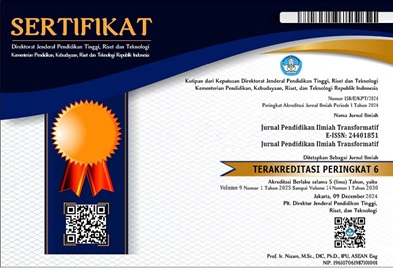PARADIGMA BARU PENDIDIKAN AGAMA ISLAM MELALUI KOLABORASI HOLISTIK, KONTEKSTUAL, DAN FUTURISTIK SEBAGAI JAWABAN ATAS TANTANGAN GLOBAL
Kata Kunci:
Pendidikan Agama Islam, Pembelajaran Holistik, Kontekstual, Futuristik, Tantangan GlobalAbstrak
Pendidikan Agama Islam (PAI) menghadapi tantangan besar di era globalisasi yang ditandai oleh kemajuan teknologi, kompleksitas sosial, dan pergeseran nilai. Artikel ini menawarkan paradigma baru dalam PAI melalui kolaborasi tiga pendekatan: holistik, kontekstual, dan futuristik. Pendekatan holistik menekankan pembentukan manusia seutuhnya dengan memperhatikan aspek kognitif, afektif, dan psikomotorik. Pendekatan kontekstual menyesuaikan proses pembelajaran dengan realitas sosial peserta didik, sementara pendekatan futuristik mempersiapkan peserta didik menghadapi perubahan zaman yang disruptif. Penelitian ini menggunakan metode kualitatif studi pustaka. Hasil kajian menunjukkan bahwa kolaborasi ketiga pendekatan ini mampu meningkatkan relevansi, efektivitas, dan daya saing global peserta didik, serta membentuk karakter Muslim yang kaffah dan adaptif terhadap pluralitas dan tantangan masa depan.
Islamic Religious Education (IRE) faces major challenges in the era of globalization, marked by rapid technological advances, social complexities, and shifting values. This article proposes a new paradigm in IRE through the collaboration of three approaches: holistic, contextual, and futuristic. The holistic approach emphasizes the formation of whole human beings by considering cognitive, affective, and psychomotor aspects. The contextual approach aligns learning processes with students' social realities, while the futuristic approach prepares students to face disruptive future changes. This research employs a qualitative library research method. The findings show that the collaboration of these three approaches can improve students' relevance, effectiveness, and global competitiveness, as well as foster comprehensive Muslim character and adaptability to pluralism and future challenges.





